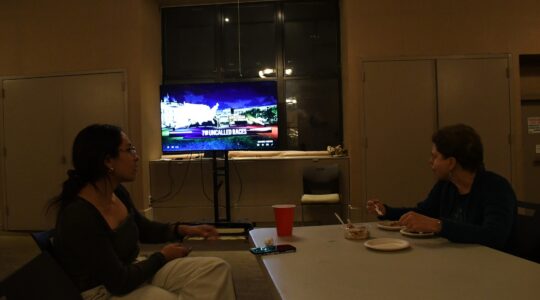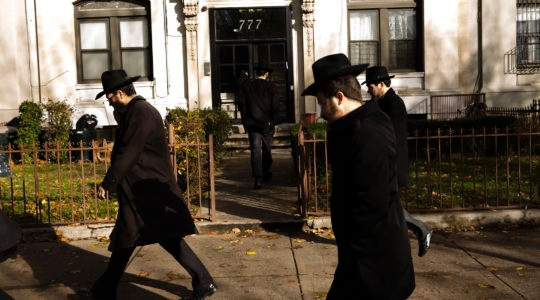Jerusalem — On their wedding
day, brides wear the most beautiful
jewelry they can buy or borrow. To the groom, his finance’s deliberations over which necklace or headpiece to wear can feel like an obsession.
While many Israeli women, especially if they are very religious, continue to choose traditional strands of pearls or a diamond pendant with matching earrings for their wedding day, an increasing number of Israeli brides are going the less-traditional route.
Israeli jewelry designers who create off-beat or one-of-a-kind pieces say business has never been so good. They attribute the demand to the growing sophistication of Israeli consumers, especially young Israelis who routinely travel abroad following their army service or for work, and see the latest American and European designs on TV.
Itzhik Sasson, the founder of the Trukiz 925 jewelry design studio, has clients from Jerusalem, Tel Aviv and far beyond. Turquoise, Shashon’s store on Yoel Solomon Street in the heart of Jerusalem, always seems to be full of both religious and secular couples looking for the perfect ring among his wide assortment of handmade engagement rings and pink, yellow and white gold wedding bands.
Sasson’s jewelry is sleek but classic. Each piece, including the most traditional of wedding rings, has a clean-lined simplicity.
“I often envision fire and water while designing, and I think this creates fluidity,” Sasson said while greeting customers. “My jewelry is very free form — more Tel Aviv than Jerusalem in some ways.”
Perhaps, but it also attracts many young Jerusalem yeshiva couples, who gravitate towards simpler, relatively unadorned wedding bands and engagement rings with semi-precious stones rather than diamonds.
“Their parents usually buy the rings and they have many children to marry off, so there are financial considerations,” Sasson said.
Sasson has a loyal clientele from overseas, who discovered his workshop during visits to Jerusalem. He doesn’t yet have a website.
“They call and say, ‘Itzhik, find something for my wife and send it to me,’” Sasson said.
Support the New York Jewish Week
Our nonprofit newsroom depends on readers like you. Make a donation now to support independent Jewish journalism in New York.
Though a much larger operation than Turkiz 925, Michal Negrin Designs also has a loyal customer base both within and outside Israel.
Sensing that her thriving company’s shimmery, romantic designs would appeal to brides, Israeli designer Negrin launched a bridal line 15 years ago that has proved “very successful,” according to Nilit Ascher, the company’s director of marketing.
The Negrin empire, which includes 50 stores — four in the U.S., including one in Atlantic City — began as a booth at the popular Nahalat Binyamin crafts fair in Tel Aviv. Her bold yet feminine jewelry and clothing, which are manufactured in a factory employing mainly new immigrants, are instantly recognizable to Israeli women.
The bridal collection, which includes roughly 100 necklaces, bracelets, earrings and hair accessories “is diverse,” Ascher said. But, like Negin’s non-bridal line, all are richly detailed. One Victorian-inspired bridal line necklace is made of lace embroidered with (faux) gold, beads and crystals. Another, made of intricate clusters of crystals, could be worn at a royal dinner.
“The bridal line combines crystal, lace, delicate flowers,” Ascher explained “and is characterized by gentle colors that compliment bridal dresses. You can find classic white, pearl, peach, pink and honey, which is especially popular in Israel.”
The bridal collection is updated every year to reflect the latest trends. This year, “you can find oversized jewelry worn next to really delicate things. Hair accessories are especially popular this year.”
Ascher noted that the brides who purchase Negrin pieces for their wedding “might not wear Michael Negrin on a daily basis,” but “when you’re a bride you’re allowed to wear something that’s a bit more spectacular. You fulfill your dreams.”
Brides and anyone else looking for one-of-a-kind pieces — especially necklaces — shop at Hedya Jewelers/Sarah Einstein, a tiny shop in the center of Jerusalem. Frommer’s guidebook calls the shop “near-legendary,” a place where you’ll find jewelry “made from exquisite component pieces of antique objects such as Yemenite wedding necklaces or tribal Persian headdre sses.”
Although Sarah Einstein, the artist whose legion of customers extended all around the world, died a while back, the store continues to exude the same old-world charm and serenity of bygone days. And the jewelry is as special as ever.
Sharon and Ze’ev Tammuz, the married couple that founded the Hedya Design Studio, travel the world looking for beads, amulets and old, often elaborate pieces of jewelry from the Near East to the Far East, which they dissemble and reinvent with semi-precious stones, silver and gold.
Ze’ev said 95 percent of the brides who come to the shop choose necklaces and earrings made from pearls.
One bold piece boasts a large golden Indian pendant with beaded “tassels” and softened by three narrow strands of pearls, gold beads and tourmaline. Another, simpler necklace ends with a 22-karat gold Indian amulet, an object worn around the neck to ward off evil.
Support the New York Jewish Week
Our nonprofit newsroom depends on readers like you. Make a donation now to support independent Jewish journalism in New York.
Because the couple designs their pieces on-site, they are able to tailor each to the tastes of the buyer. This is especially useful for brides, who invariably purchase their wedding dress before choosing their jewelry.
“Someone will come in and say, ‘This would be perfect if you removed that green bead’ or ‘I’d buy it if it were a bit shorter.’ So we restring or shorten or create something entirely new, according to the buyer’s specifications. That’s Hedya,” Zeev says.
|
Signup for our weekly email newsletter here. Check out the Jewish Week’s Facebook page and become a fan! And follow the Jewish Week on Twitter: start here. |




